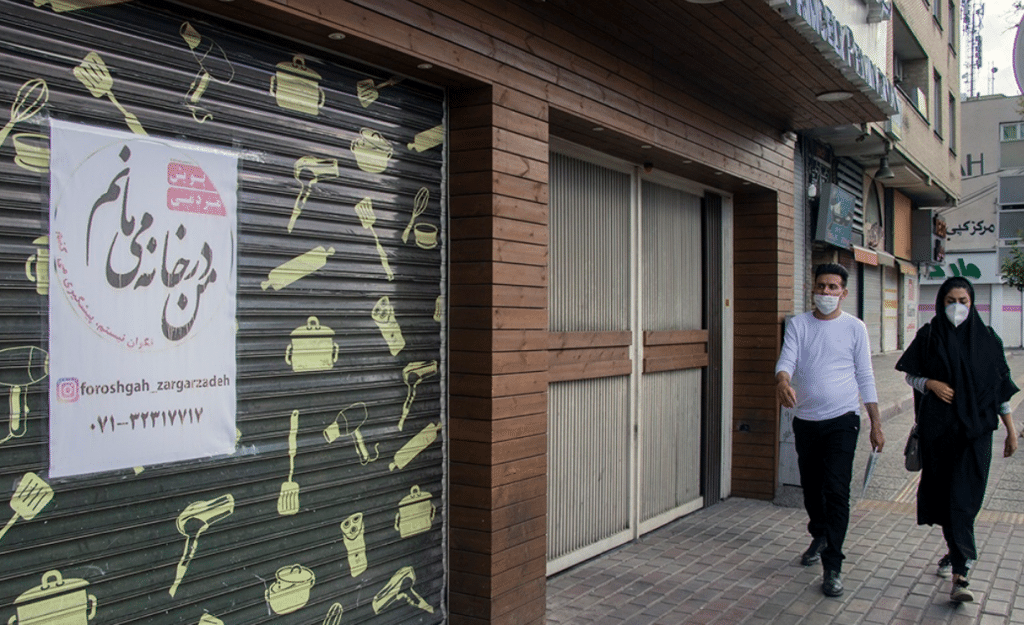Coronavirus in the Middle East: A rare opportunity for diplomacy?
By Chen Zak Kane, Rhianna Tyson Kreger | April 10, 2020
 People in Shiraz walking next to a closed market, March 14, 2020. Image credit: Mohammadreza Farbood via Wikimedia Commons.
People in Shiraz walking next to a closed market, March 14, 2020. Image credit: Mohammadreza Farbood via Wikimedia Commons.
Across the world, the COVID-19 pandemic has given a boost to go-it-alone political nationalism. This is true in the Middle East as much as it is anywhere else, but countries in the region will have to buck the trend and cooperate like never before if they want to make it out intact.
The return of nationalism and strong borders was predictable. After all, the virus doesn’t travel; virus-infected people travel, and in doing so spread the disease. Extreme measures limiting people’s movement can only be enacted—and enforced—by states. International and regional organizations have neither the authority nor the capacity in this regard. In fact, the World Health Organization might even have played a role in enabling the spread of the virus by its reluctance to recommend restrictions on the movement of people.
In the Middle East, governments and societies are more accustomed to restricting individual freedoms in the name of national security. In Israel, Iran, Jordan, and the Gulf countries, such retrenchment is proceeding with an intensity that is unprecedented even in the region: authorities are limiting movement; some have deployed the army in their streets to enforce curfews; others are tracking infected people by their mobile phones; and still others are organizing and deploying neighborhood watch teams. This proclivity may prove to be the region’s advantage over its Western counterparts, where such actions have come slowly, late, and in some places, not at all.
Such a proclivity isn’t all good news, though. The question remains whether these governments will readily relinquish such tight-fisted control after the pandemic ebbs, or what form the backlash to them will take, and when.
From states to sects. While nationalism has proven strong, sectarianism may prove even stronger. The undercurrent of sectarianism that pervades the Middle East hampers the coordination of response to, and even exchange of information on, the novel coronavirus between states. In the Middle East—as elsewhere—the coronavirus has sparked new waves of fear, stigma, xenophobia, and racism, as well as reactions of denial, delayed responses, myth-mongering, and conspiracy theories. While in the United States this is manifesting at the highest levels, with leaders insisting on calling it the “Wuhan virus” or the “Chinese virus,” in the Middle East, racism is spiking toward foreigners in general, not only East Asians and South Asians—the latter of whom comprise large foreign-worker populations in many of these states—but also against other Arabs and Westerners. And with Iran reporting the first explosion of cases in the initial phase of the pandemic, a popular conspiracy theory continues to circulate that the virus is a Shi’a plot aimed at infecting the Sunni population.
A short-lived victory. Despite the showing of strength in these initial days of the pandemic, the risks to several Middle Eastern countries is real. The virus is on course to devastate their economies, social systems, and large portions of their populations—and with them, the regimes that govern them. Prior to the outbreak, countries such as Iran, Jordan, Lebanon, Yemen, and Syria were already on the brink of—or even plunged into—economic collapse. The tension between the recommendations of religious authorities and health officials, where the former have refused to close worship spaces, is driving the infection rate at an alarming speed and placing unnecessary additional stress on public health systems. The economic collapse of many of these countries will only increase citizens’ anxieties and stoke anger toward their government’s handling of the crisis.
If these regimes want to survive the pandemic, they must recognize that they cannot do so in isolation. There are already encouraging signs that some governments are beginning to recognize this. Saudi Arabia has announced a unilateral ceasefire in the five-year war in Yemen, intended not only to avoid exacerbating the coronavirus spread but also, according to Saudi officials, to breathe life into the UN-brokered peace talks between the parties there. The United Nations has complimented the close coordination and cooperation between Israel and Palestine to contain the disease and provide necessary equipment and supplies. Gulf countries have demonstrated a willingness to assist hard-hit Iran, if even on a small scale. Qatar announced that it is sending urgent medical supplies to Iran, and Kuwait announced it will donate $10 million to Iran’s healthcare fight. The United Arab Emirates has facilitated flights for the World Health Organization to deliver aid to Iran, and the Emirati foreign minister had a rare phone conversation with his Iranian counterpart about the response to the virus.
It is possible that the technical-level discussion to coordinate medical and scientific efforts to combat the coronavirus could open up a much-needed diplomatic dialogue for reducing tension in the region. Ironically, the conflict and instability-plagued Middle East could turn the coronavirus crisis into an opportunity. Whether such an opportunity is seized—or if it, like so many other opportunities before it, is squandered—is up to the regional states themselves.
Together, we make the world safer.
The Bulletin elevates expert voices above the noise. But as an independent nonprofit organization, our operations depend on the support of readers like you. Help us continue to deliver quality journalism that holds leaders accountable. Your support of our work at any level is important. In return, we promise our coverage will be understandable, influential, vigilant, solution-oriented, and fair-minded. Together we can make a difference.
Keywords: COVID-19, Coronavirus, Israel, Middle East, Saudi Arabia
Topics: Analysis, Biosecurity
















